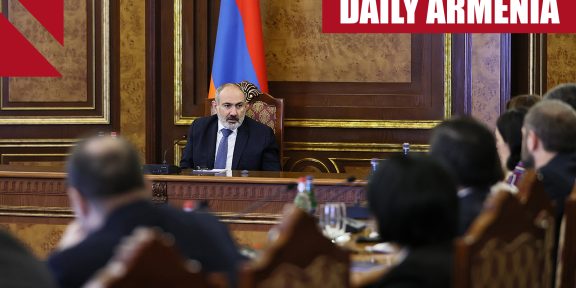 By Emil Sanamyan,
By Emil Sanamyan,
USC Institute of Armenian Studies
On April 20, as the mass protests were underway in Armenia, Nikol Pashinyan made a series of demands of the Armenian government. Three of these demands – Serzh Sargsyan’s resignation, appointment of the protest-supported candidate as prime minister and formation of a new government – have been fulfilled. There was also the fourth demand that remains to be addressed: that per mutual agreement between this new government and the Republican Party that makes up the parliamentary majority the new government’s program is voted down, triggering an early election.
However, upon closer reading of the constitution (Article 151), it became apparent that voting down the government program – by itself – does not trigger new elections. Voting down the program would instead trigger the government’s resignation and a new parliamentary vote for prime minister. Should the parliament twice fail to elect a new prime minister, that is what would in turn trigger a new election. Should Pashinyan decide to resign at any point, this would also trigger a new vote for prime minister and potentially lead to new elections.
In other words, vote on the program is not the only way to the new elections. One year from Pashinyan’s appointment, the parliament would gain the right of vote of no-confidence towards prime minister, which would also lead to elections of new prime minister and potential dissolution if none is elected. Until then, any early election would require an agreement between Pashinyan and the parliamentary majority, still held by the Republicans.
Politics of timing
Considering the current level of popular support for Pashinyan and the popular backlash against Republicans, the former ruling party would prefer to postpone any new election for as long as possible. This means the Republicans are unlikely to vote down Pashinyan’s program – now expected to be voted on in early June – unless they are ready to elect another candidate as prime minister and face fresh protests, an unlikely scenario.
Pashinyan himself does not appear to be eager to have a new election take place as soon as possible. At least, in his recent comments Pashinyan remained vague on his preferred election date, though he has suggested that he would prefer the election to happen this year. The first deputy prime minister Ararat Mirzoyan suggested even longer wait was possible, more than one year.
This may seem counterintuitive considering that Pashinyan would want to capitalize on his current level of public support and hold an election earlier. But the pace of political change in Armenia had caught off guard not only the ruling party, but the opposition as well. Clearly, Pashinyan’s still relatively small party – the Civil Contract – also needs time to prepare for any new elections, building up electoral lists and evaluating would be political allies.
Pashinyan also mentioned plans for additional anti-fraud safeguards that he wants included in an amended electoral code. This and any other legislative initiatives – as well as potential parliamentary vote for a new prosecutor general – would require support from Republicans. Should Republicans begin to stonewall the new government’s initiative, this would lead to greater likelihood of Pashinyan resigning and mobilizing public support for new elections.
If recent polling is to be believed, at this point a Pashinyan-led list could capture upwards of 80 percent of the vote, with Gagik Tsarukyan-led Prosperous Armenia and Republicans struggling to cross the minimum threshold of five percent. A potential one-party parliament would also be less than an optimal outcome both for the new prime minister and Armenia as a country.
More time would theoretically help all political stakeholders to be better prepared for a new election.
Emil Sanamyan lives in Washington DC, and specializes in the politics of the Caucasus.
















